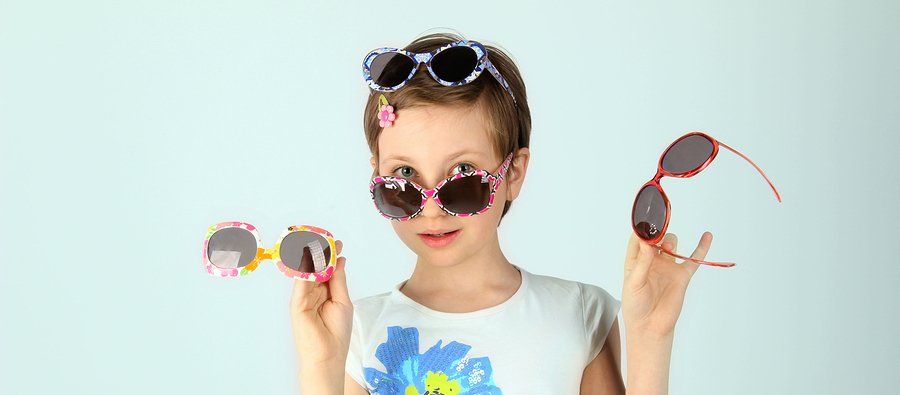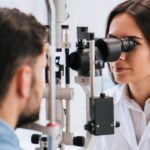Most of us have a vague notion that it’s important to don shades with UV protection in order to protect our eyes from developing cataracts, and sunglasses look cool and are great for hiding red eyes after you’ve been crying. Plus, they cut down on glare, so from the comfort point of view, it’s less of a strain to be outside in sunny weather. You aren’t squinting as much and are much less likely to get a headache, if you’re prone to that.
But if that’s not enough for you, it’s worth keeping in mind that exposing your eyes to bright sunshine for prolonged periods incurs plenty of other dangers that might not be on your radar. For one thing, exposure to certain types of ultraviolet radiation from the sun can contribute to macular degeneration, which eventually can cause blindness.1 “7 Reasons Why You Should Wear Sunglasses More Often.” Summer Skin. 30 March 2018. http://yoursummerskin.com/blogs/news/75510533-7-reasons-why-you-should-wear-sunglasses-more-often Bright sunshine also exacerbates glaucoma, another vision-robbing disease. Plus, the sun can cause a weird condition called pterygium (otherwise known as “surfer’s eye”), which creates a thick membrane that covers your eyes, interfering with vision and looking gross. Even worse, exposure increases the risk of cancer of the eye or eyelid. Surprisingly, 10 percent of all skin cancers are in the eye region.
Given how much risk the sun poses to the eyes, it makes sense to wear protective sunglasses, but the question is whether sunglasses actually provide that needed protection. If so, what type of sunglasses work best?
Well, the answers to the first question is “yes,” and it does matter what type of glasses you wear. Your sunglasses should block out at least 99 percent of all UVA and UVB radiation.2 “Keeping Your Eyes Healthy: Wear sunglasses.” NIH National Eye Institute. 29 March 2018. http://nei.nih.gov/hvm/healthy_eyes_glasses The label should indicate the degree of UV protection. Note that in the US, lenses marked “ANSI Z80.3” or UV 400 pass the minimum safe standard, as do lenses marked “CE” in Europe, or “AS1067” in Australia. Lens color has nothing to do with UV protection, by the way, so don’t assume that darker lenses do a better job. Experts say even clear lenses can provide that UV coverage while dark lenses might provide none. In fact, wearing dark lenses that lack adequate UV protection can create more problems for your eyes than going without sunglasses at all, because the dark lenses cause your pupils to dilate and make the eyes more vulnerable to damage.3 Farrimond, Stuart. “The Shady Truth About Sunglasses: How Safe Are Your Eyes?” April 2011. The Science of Health, Food, and Life Explained. 30 March 2018. http://realdoctorstu.com/2011/04/26/the-shady-truth-about-sunglasses-are-your-eyes-safe/
Also, while polarized lenses do reduce glare, they don’t protect you from UV rays, unless the lenses also have UV coating. The best protection will be afforded by glasses with 100-percent UV protection that wrap around your eyes. Glare can sneak in the side of the glasses otherwise. Even better is if the glasses also block “blue rays,” which hit the eye in a more diffused way than UV rays and also contribute to macular degeneration and other eye problems.4 http://www.wearsurfglasses.com/bluelight.html
So, you think you’ve now got it covered. Unfortunately, not necessarily. Here’s the kicker: just because lenses are marked as providing 100-percent protection doesn’t mean they do. Several studies have found that many sunglass manufacturers make plenty of inflated claims about UV protection that don’t stand up to testing, whether the sunglasses are the $10 drugstore variety or the $200+ specialty types. Back in 2014, a laboratory in Brazil developed a machine that allows users to slip in their sunglasses and get back a reading of actual UV protection.5 Laycock, Emma. “Are your sunglasses really protecting your eyes from UV?” On Health. 30 March 2018. http://blogs.biomedcentral.com/on-health/2014/06/27/are-your-sunglasses-really-protecting-your-eyes-from-uv/ In a trial run, the machine tested 800 pairs of sunglasses and found that 160 didn’t measure up to their supposed protection level. Subsequent studies have found equivalent results. You can check your own sunglasses by investing in a UV meter, which you can purchase for under $40 on the internet or ask your optometrist to check them for you.
And again, you think you’ve now got it covered. But again, not necessarily. You see, another wrinkle that most of us aren’t aware of is that UV protection may wear off within a few years.6 MacMillan, Amanda. “You May Need to Replace Your Sunglasses More Often Than You Think.” 30 August 2016. Health. 1 April 2018. http://www.health.com/mind-body/uv-protection-tests-sunglasses Even if your sunglasses measure up when you purchase them, don’t assume they’ll provide the same level of UV protection a few years later. Studies at the University of Sao Paolo in Brazil found that after several years of exposure to sunlight, the UV protection on sunglasses degraded to the point where the glasses needed replacement. While the researchers state that the tests are not yet conclusive, there’s enough evidence to make it prudent to at least test your older sunglasses to see how much UV protection they currently provide. Also, by the way, other protective coatings may wear thin over time.
The bottom line:
- It’s important to wear sunglasses, and not just when the sun blazes hot. Experts say it’s also essential to wear your shades in snowy conditions, and even in the shade when there’s occasional glare breaking through. And no, despite what Corey Hart said, you don’t have to wear your sunglasses at night.
- Your sunglasses should be large enough to give your eyes total coverage, which means wraparound or oversized is the way to go.
- Most important, make sure that your glasses offer at least 99-percent UV protection, preferably 100 percent, and if possible, that they’re also polarized to cut down on glare and improve depth perception.
- Remember, high cost does not guarantee high quality from the standpoint of protection. Cheap glasses can also do the trick. If you choose brown or dark amber lenses, you’ll eliminate most blue light as well.
- And finally, remember to test the glasses to make sure the protection is as claimed. And replace them regularly or, at least, test them regularly as they age to make sure that protection doesn’t lessen over time.
References
| ↑1 | “7 Reasons Why You Should Wear Sunglasses More Often.” Summer Skin. 30 March 2018. http://yoursummerskin.com/blogs/news/75510533-7-reasons-why-you-should-wear-sunglasses-more-often |
|---|---|
| ↑2 | “Keeping Your Eyes Healthy: Wear sunglasses.” NIH National Eye Institute. 29 March 2018. http://nei.nih.gov/hvm/healthy_eyes_glasses |
| ↑3 | Farrimond, Stuart. “The Shady Truth About Sunglasses: How Safe Are Your Eyes?” April 2011. The Science of Health, Food, and Life Explained. 30 March 2018. http://realdoctorstu.com/2011/04/26/the-shady-truth-about-sunglasses-are-your-eyes-safe/ |
| ↑4 | http://www.wearsurfglasses.com/bluelight.html |
| ↑5 | Laycock, Emma. “Are your sunglasses really protecting your eyes from UV?” On Health. 30 March 2018. http://blogs.biomedcentral.com/on-health/2014/06/27/are-your-sunglasses-really-protecting-your-eyes-from-uv/ |
| ↑6 | MacMillan, Amanda. “You May Need to Replace Your Sunglasses More Often Than You Think.” 30 August 2016. Health. 1 April 2018. http://www.health.com/mind-body/uv-protection-tests-sunglasses |












what are your thoughts of the
what are your thoughts of the sun gazers for health movement? which is only done very early sunrise and very late sunset?